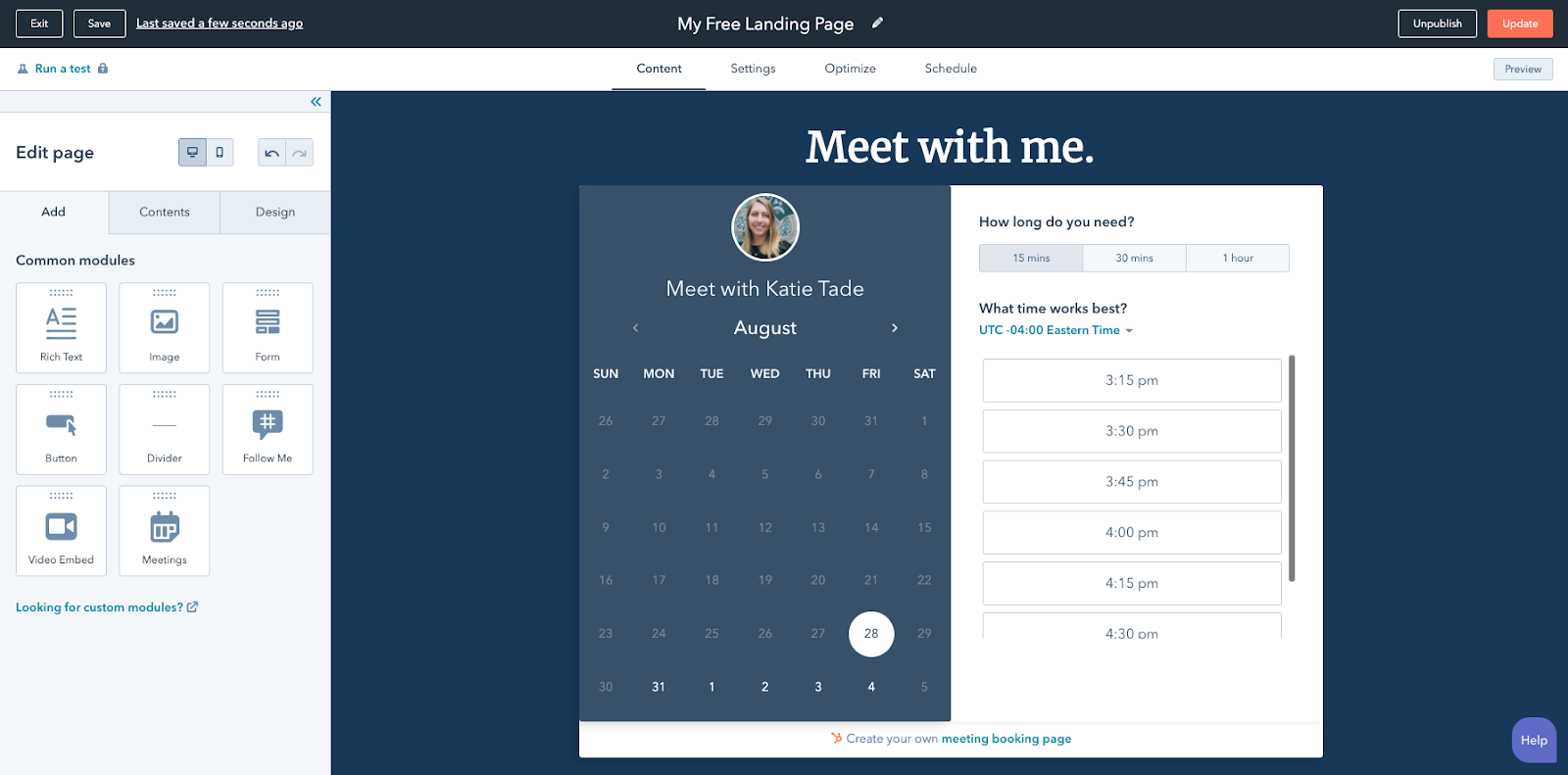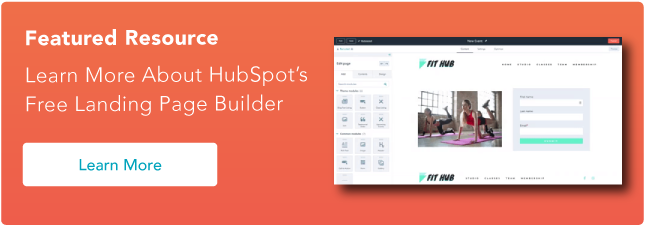
It doesn’t matter how awesome your e-book is if no one can download it.
And you might have the perfect agenda for your webinar, but if your customers can’t sign up, it’ll all be for nothing.
That’s why you need an effective landing page. They’re simple pages — often with just a few lines of text and a form — to drive conversions and turn visitors into leads.
When done correctly, a landing page can help you generate leads and pass off those qualified leads to your sales team.
Here, we’ll break down seven landing page builders and outline their costs, benefits, and drawbacks.
What is Leadpages?
One of the most popular tools for creating landing pages is Leadpages.
Leadpages offers a variety of tools that can help you create compelling landing pages — including pop-ups, a drag-and-drop page editor with a seemingly endless list of pre-made templates, and more.
But Leadpages doesn’t have a free version to help you get started, and doesn’t offer many marketing tools beyond landing pages.
If you’re looking for an alternative to Leadpages, there are a number of different tools that you can explore.
Let’s take a look at the seven best Leadpages alternatives.
Best Leadpages Alternatives
- HubSpot’s Landing Page Builder
- Unbounce
- Instapage
- Mailchimp
- Clickfunnels
- Sendinblue
- GetResponse
1. HubSpot’s Landing Page Builder
HubSpot’s landing page builder helps you build beautiful landing pages that fit seamlessly into your marketing campaigns.
The drag-and-drop page editor is easy to use, and comes with a variety of templates for a number of different content offer types.
It includes all of the modules you’d expect, like a rich text module and a forms module, but it also has a video module and a meetings module, so your prospects can book meetings with your sales team directly on your landing pages.
Price: Free
Pros: HubSpot’s landing page builder is available for free and comes with the HubSpot CRM.
With the CRM, you can track every interaction your prospects have with your brand, allowing you to create marketing campaigns that focus on the end-to-end customer experience. And with HubSpot Academy, you’ll be able to learn how to effectively run a marketing campaign and easily apply those learnings to the next campaign you run.
As you grow your business, HubSpot’s landing page builder grows with you. You’ll be able to run machine-learning powered tests on your landing pages to ensure you’re constantly optimizing your pages for conversions, and revenue attribution reporting shows you exactly which offers are impacting your bottom line.
Cons: If you’re looking for more advanced features to help scale your marketing operations, you may need to upgrade to HubSpot’s Starter, Professional, and Enterprise plans of Marketing Hub.
2. Unbounce
Unbounce is one of the most popular landing page builders on the market today.
They provide landing pages and pop-ups geared at turning traffic into revenue for your business. Unbounce comes with over 100 templates that you can easily customize in their drag-and-drop editor. All their templates also work with WordPress.
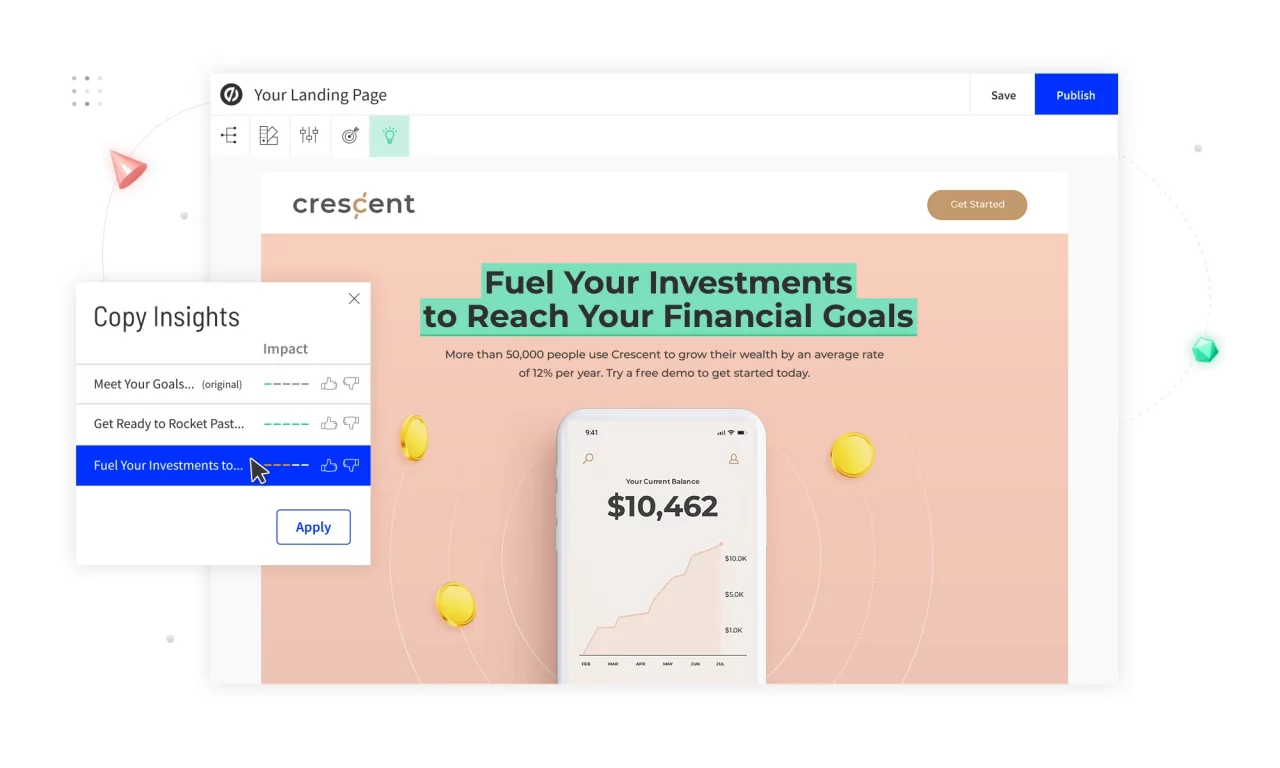
Price: $90/month
Pros: With Unbounce, you never start from a blank page. Powered by AI, its Smart Builder pulls data from over 1.5 billion conversions — helping you to predict which layouts and headlines will work best for your target audience.
Cons: Although powerful, Unbounce charges you based on the number of conversions you receive on your pages. For growing companies, this can add up quickly as you generate more leads from your content offers.
3. Instapage
Like the other landing page builders on this list, Instapage offers an easy-to-use content editor, and a number of templates to create your pages.
Instapage also includes a feature called AdMap. With AdMap, you’ll be able to visualize how your ads match your landing pages, and report on the effectiveness of your ad campaigns personalization.
Their landing page solution also lets you leave comments on different elements of a landing page and @mention team members of yours, making it easy to collaborate on your marketing campaigns.
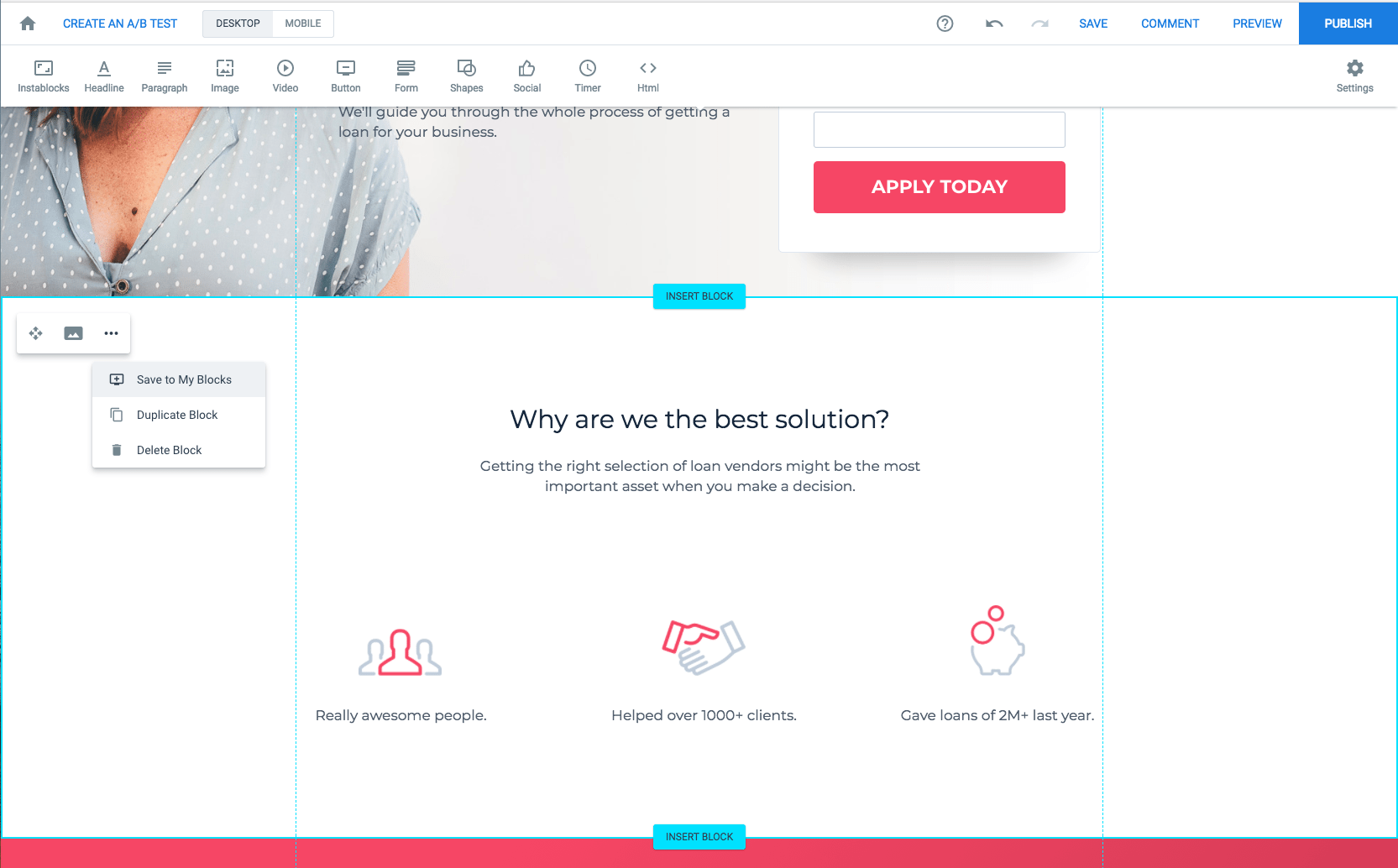
Price: $199/month
Pros: Instapages is one of the few landing page builders with built-in collaboration. We also like its 500+ layouts and near-instant page loads — with or without AMP.
Cons: Instapages limits the number of pages you can create, how many users you have, and the number of unique visitors to your pages.
4. Mailchimp
Mailchimp now does so much more than email.
They’ve built out a full suite of marketing tools that helps small businesses get up and running with their digital marketing efforts. Their landing page builder works alongside their ads, email, and social media tools.
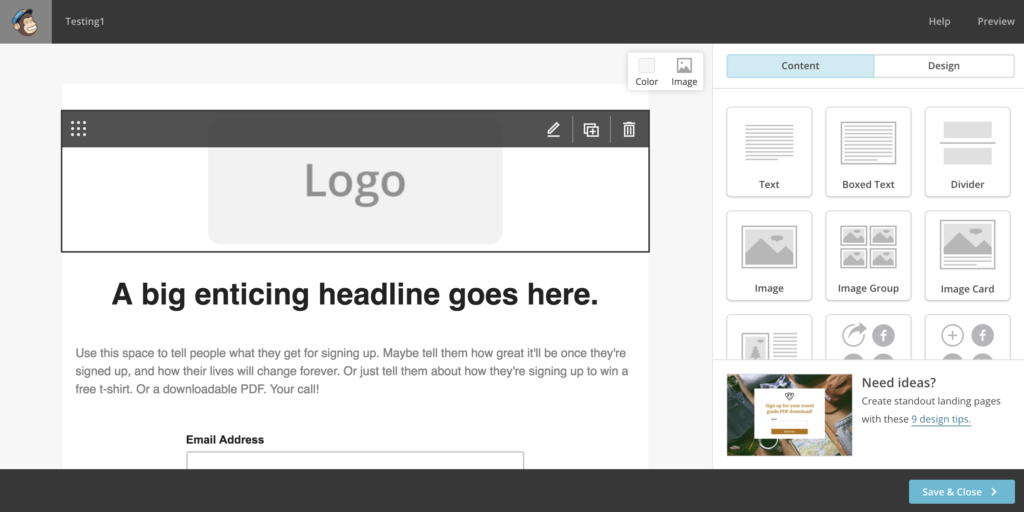
Price: Free — to a point. Paid plans start at $11/month
Pros: Their drag-and-drop editor is easy to use and lets you create beautiful on-brand landing pages in minutes.
Cons: You may need to upgrade to their paid tier to start collaborating with your teammates, get access to more templates, or start optimizing your campaigns.
5. Clickfunnels
Clickfunnels is a landing page builder and marketing automation tool focused on the sales audience.
Clickfunnels believes that your content should produce results just like your best sales reps would, and it’s a solution aimed at moving prospects through a sales funnel into becoming customers.
Clickfunnels has a number of templates to choose from based on intent — such as up-sell or webinar event pages. To edit these templates, you can use their drag-and-drop page editor to create a page that works for you and your business.
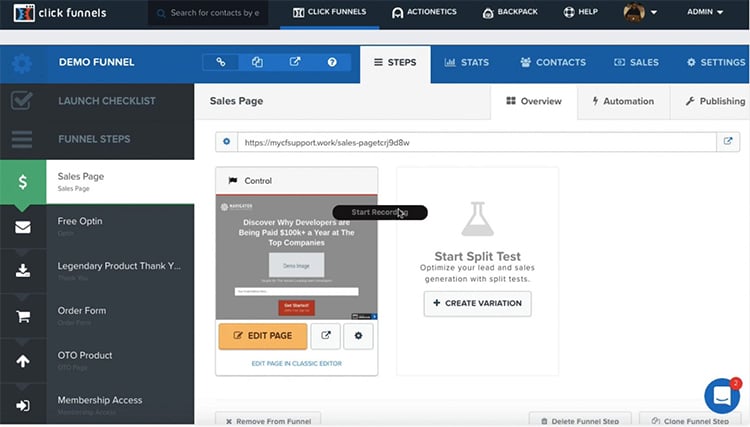
Price: $97/month
Pros: They have pre-built “funnels” that you can use to visualize your customer’s journey with your brand — including follow-up funnels that will help you cultivate relationships with users who’ve converted on your content.
Cons: An important limitation to Clickfunnels is its lack of email marketing capabilities. Of course, you can integrate Clickfunnels with an email marketing tool, but this requires an additional fee on top of the $97/month starter plan.
6. Sendinblue
Sendinblue is a simple marketing automation tool that features a number of different tools that SMBs need.
From email marketing, SMS, Facebook Messenger, and a CRM, you get a suite of tools that can help you communicate effectively with your customers.
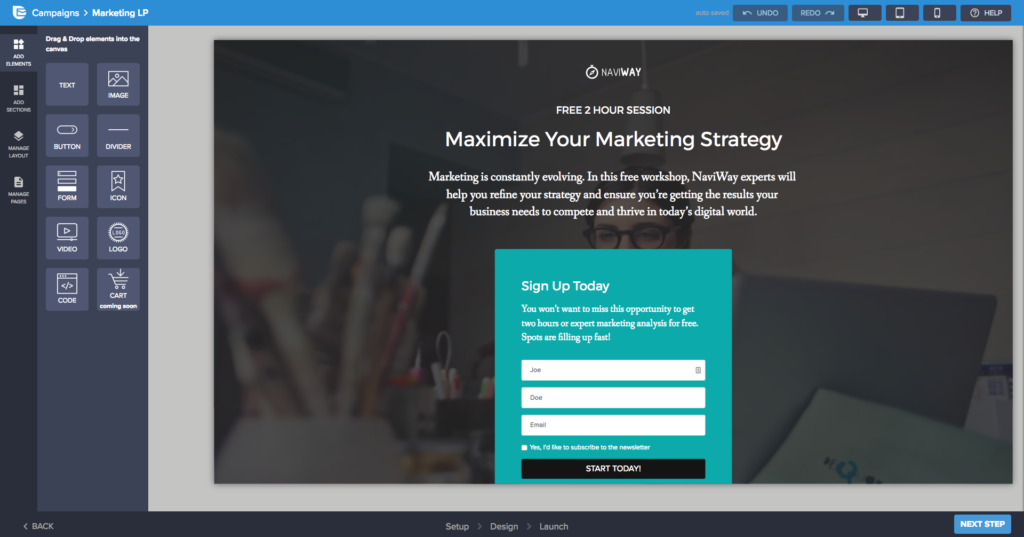
Price: $65/month
Pros: Their suite of tools includes an intuitive and straightforward landing page builder with pre-built templates you can choose from.
Cons: Although intuitive, their landing page builder is not included in their free product offering. However, other free offerings like their email marketing and SMS features are a great way to see if Sendinblue is right for you.
7. GetResponse
Like other landing page builders on this list, GetResponse comes with a variety of tools that can help you build amazing marketing campaigns.
With email marketing and pre-built sales funnels, you can quickly begin marketing to the leads that you generate on your landing pages. You can create your own design or choose from over 200 templates.
They also include a mobile-first editor in case you want to enhance your mobile-visitors experience.
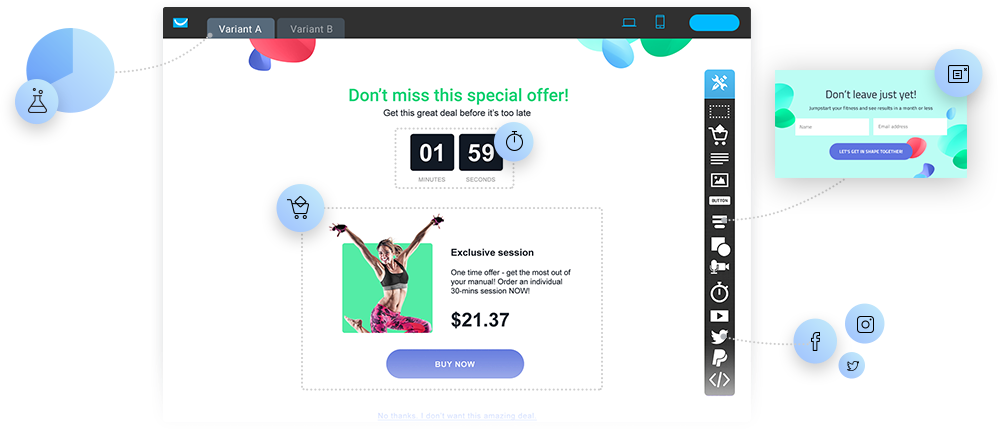
Price: Create one landing page for free, then $12/month
Pros: What sets GetResponse apart are its features they provide to help you design your pages. For instance, they have built-in integrations with Shutterstock and Giphy to help you add compelling visuals to your landing pages.
Additionally, its drag-and-drop builder is incredibly flexible, allowing you to place content blocks wherever you want on the landing page (rather than designated placeholders).
Cons: GetResponse is primarily an email marketing tool, not a landing page builder. So if you’re looking to get advanced with your landing pages, it’s a good idea to test it out first.
Choosing the Best LeadPages Alternative
Ultimately, deciding what landing page builder you go with will depend on your business’ needs.
For instance, if you’re looking for a point solution, tools like Unbounce or Instapage will be great for you — alternatively, if you’re looking for a platform that you can use across all your marketing efforts, other tools like Mailchimp or GetResponse will be better suited for your needs.
And, for growing teams looking to align their marketing efforts around the customer experience, HubSpot’s landing page builder is a powerful choice for you. You can get started for free, and track your customers’ journey with your brand through the HubSpot CRM.
Plus, as you grow, you not only avoid having to rip out other tools, but you gain access to more advanced solutions that will help you unlock even more insights into your customers’ experience.

